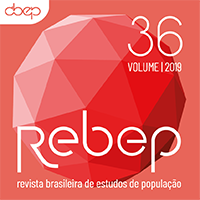Analysis of secularization in Brazil
DOI:
https://doi.org/10.20947/S0102-3098a0084Keywords:
Secularization, Brazil, Models of discrete choiceAbstract
This paper analyzes whether Brazil is experiencing a religious secularization process using data from Brazil Religion Survey conducted in 2007. Models of discrete choice are estimated to understand which individual attributes affect disaffiliation, disbelief and lack of religious practice, therefore confirming or disproving secularism hypotheses. Estimations confirm some hypotheses of the theory, for example, that having liberal opinions concerning moral and social issues is positively associated with secularism, and that lower income levels result in lower chances of disaffiliation. In addition, the profile of non-religious people, non-believers
and those who do not practice religion is similar. Therefore, it is possible to affirm that there is secularization in Brazil.
Downloads
References
ALMEIDA, R. de; MONTERO, P. Trânsito religioso no Brasil. São Paulo em Perspectiva, v. 15, n. 3, p. 92-100, 2001.
ALVES, J. E. D.; CAVENAGHI, S. M.; BARROS, L. F. W.; CARVALHO, A. A. de. Distribuição espacial da transição religiosa no Brasil. Tempo Social, v. 29, n. 2, p. 215-242, 2017.
AZZI, C.; EHRENBERG, R. Household allocation of time and church attendance. Journal of Political Economy, v. 83, n. 1, p. 27-56, 1975.
BARRO, R.; MCCLEARY, R. M. International determinants of religiosity. Cambridge: National Bureau of Economic Research, 2003. (NBER Working Paper, 10147).
BRAÑAS-GARZA, P.; GARCÍA-MUÑOZ, T.; NEUMAN, S. Unravelling secularization: an international study. Bonn, Germany: Institute for the Study of Labor (IZA), 2007. (IZA Discussion Paper, 3251).
COSTA, F. J. M. D.; MARCANTONIO JUNIOR, A.; CASTRO, R. R. D. Stop suffering! Economic downturns and pentecostal upsurge. Rio de Janeiro: Escola de Pós-Graduação em Economia da FGV, 2018. (Ensaios Econômicos, n. 804).
COUTINHO, R. Z.; GOLGHER, A. B. The changing landscape of religious affiliation in Brazil 1980-2010: age, period and cohort perspectives. Revista Brasileira de Estudos de População, v. 31, n. 1, p. 73-98, 2014.
DOBBELAERE, K. Towards an integrated perspective of the processes related to the descriptive concept of secularization. Sociology of Religion, v. 60, n. 3, p. 229-247, 1999.
FONSECA, A. B. Nova Era evangélica: confissão positiva e o crescimento dos sem religião. Revista de Estudos e Pesquisa da Religião, v. 3, n. 2, p. 63-90, 2000.
GREENE, W. H. Econometrics analysis. 5. ed. Upper Saddle River, NJ: Prentice Hall, 2003.
HALMAN, L.; DRAULANS, V. How secular is Europe? The British Journal of Sociology, v. 57, n. 2, p. 263-288, 2006.
HACKETT, C.; GRIM, B. J. The global religious landscape: a report on the size and distribution of the world's major religious groups as of 2010. Pew Research Center, Pew Forum on Religion & Public Life, 2012.
IANNACCONE, L. R. Introduction to the economics of religion. Journal of Economic Literature, v. 36, n. 3, p. 1465-1495, 1998.
INSTITUTO DE PESQUISAS DATAFOLHA. Brazil Religion Survey. 2007. Available in: http://www.thearda.com/Archive/Files/Downloads/BRAZIL_DL.asp. Access in: Feb. 2015.
IRFFI, G.; CRUZ, M. S. da; CARVALHO, E. B. S. Reasons for embracing a religion: the case of Brazilian women. EconomiA, v. 18, n. 2, p. 168-179, 2017.
JACOB, C. R. Atlas da filiação religiosa e indicadores sociais no Brasil. São Paulo: Edições Loyola, v. 7, 2003.
MACHADO, M. D. D. C.; BURITY, J. A ascensão política dos pentecostais no Brasil na avaliação de líderes religiosos. Dados – Revista de Ciências Sociais, v. 57, n. 3, p. 601-631, 2014.
MCCLEARY, R. M.; BARRO, R. J. Religion and economy. Journal of Economic Perspectives, v. 20, n. 2, p. 49-72, 2006.
MONTERO, P. Secularização e espaço público: a reinvenção do pluralismo religioso no Brasil. Etnográfica – Revista do Centro em Rede de Investigação em Antropologia, v. 13, n. 1, p. 7-16, 2009.
MOREIRA-ALMEIDA, A.; PINSKY, I.; ZALESKI, M.; LARANJEIRA, R. Envolvimento religioso e fatores sociodemográficos: resultados de um levantamento nacional no Brasil. Revista de Psiquiatria Clínica, v. 37, n. 1, p. 12-15, 2010.
NERI, M. C. Economia das religiões: mudanças recentes. Fundação Getúlio Vargas, 2007.
OLIVEIRA, L. L. S. de; CORTES, R. X.; NETO, G. B. Quem vai à igreja? Um teste de regressão logística ordenada do modelo de Azzi-Ehrenberg para o Brasil. Estudos Econômicos, v. 43, n. 2, p. 363-396, 2013.
PRANDI, R.; SANTOS, R. W. dos. Quem tem medo da bancada evangélica? Posições sobre moralidade e política no eleitorado brasileiro, no Congresso Nacional e na Frente Parlamentar Evangélica. Tempo Social, v. 29, n. 2, p. 187-213, 2017.
RODRIGUES, D. S. dos. Religiosos sem igreja: um mergulho na categoria censitária dos sem religião. Revista de Estudos da Religião, p. 31-56, dez. 2007.
STARK, R. Secularization, rip. Sociology of Religion, v. 60, n. 3, p. 249-273, 1999.
THE ASSOCIATION OF RELIGIOUS DATA ARCHIVES. Secularization. Pennsylvania: The Association of Religion Data Archives, 1998. Available in: http://wiki.thearda.com/tcm/theories/secularization/. Access in: June 15, 2015.
VAUS, D.; MCALLISTER, I. Gender differences in religion: a test of the structural location theory. American Sociological Review, v. 52, n. 4, p. 472-481, Aug. 1987.
VOAS, D.; CROCKETT, A. Religion in Britain: neither believing nor belonging. Sociology, v. 39, n. 1, p. 11-28, 2005.
WILLIAMS, L. M.; LAWLER, M. G. Religious heterogamy and religiosity: a comparison of interchurch and same church individuals. Journal for the Scientific Study of Religion, v. 40, n. 3, p. 465-478, 2001.
Downloads
Published
How to Cite
Issue
Section
License
Papers published in Rebep are original and protected under the Creative Commons attribution-type license (CC-BY). This license allows you to reuse publications in whole or in part for any purpose, free of charge, even for commercial purposes. Any person or institution can copy, distribute or reuse the content, as long as the author and the original source are properly mentioned.

